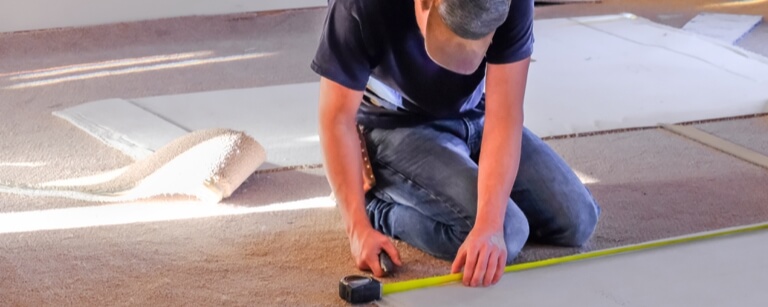Flooring Contractor Insurance
Affordable Protection for Your Floor Installation Business
Simply Business is pleased to provide tailored insurance options from:
Protect Your Business with Insurance for Flooring Contractors.
You work hard to deliver the best quality work to your customers. But as you’re busy meeting with customers, quoting projects, and learning new techniques, who has your business’s back?
That’s where we — Simply Business — come in!
We’re an online insurance platform that makes it easy for flooring contractors to find customized floor contractor insurance coverage. From general liability insurance to workers compensation coverage, we’ll help you find a policy for your business.
It’s easy to get coverage. If you give us 10 minutes of your time, we’ll show you policies that will help protect you and your business from the biggest risks.
Ready to get insurance coverage?
Need more detail? Read our FAQs:
Business Insurance Policies Available for Flooring Contractors:
- General liability insurance
- Workers compensation insurance
Benefits:
- It can protect your business from certain claims.
- It can cover damages caused by your negligence.
- Proof of insurance can help clients feel good about your work.
- It may be required where you’re located.

What Types of Insurance Do I Need for My Flooring Contractor Business?
Insurance for flooring contractors can be designed to include various policies, each of which can protect your business from common risks and liabilities. When deciding on insurance for your flooring contractor business, we suggest considering these core plans as part of your foundational policy:
Commercial General Liability Insurance
If you rent an office space for your business, you’ll likely need commercial general liability insurance. This type of coverage — also known as general liability (GL) insurance — covers any costs associated with third-party accidents, damage to property, and bodily injury to a third party (e.g., a vendor or customer).
General liability insurance is highly recommended for flooring contractors, as it can protect you from large claims and expenses. In fact, did you know that the average customer injury or damage claim — something that GL covers — is $30,000?
So if you don’t have general liability coverage, you may be responsible for paying those costs out of pocket.
How does GL insurance work? Let’s say you’re ripping up old flooring for a customer’s project. While working, you stumble over a loose board and accidentally put a hole through the wall. Not only do you have to pay for the damage you did, but you might have to worry about legal fees if your customer decides to sue you.
However, if you have general liability insurance, your policy can potentially cover both your legal bills and the cost to repair the wall (up to your policy limit). What a relief, right?
Here’s what general liability insurance usually can cover:
- Bodily injury to another person
- Third-party property damage
- Personal and advertising injury
- Medical expenses
- And more
Now here’s what general liability insurance usually doesn’t cover:
- Damage to your own property
- Professional services
- Workers compensation or injury to your employees
- Damage to your work
- Motor vehicles while in business use
- Expected or intentional injury or damage
- And more
Workers Compensation Insurance
If you have any full-time, part-time, or even temporary employees, you may be required by your state to have workers compensation insurance for your flooring contracting business. Workers compensation insurance typically protects both you and your employees from accidents, injuries, or illnesses that occur while working.
Most states require business owners who have employees to carry some form of workers compensation coverage. As a starting point, you can check your state’s laws to make sure you obtain the proper coverage (and avoid any potential fines). We recommend confirming with a professional such as a lawyer or accountant to ensure your specific business is following the appropriate regulations, though.
Having workers compensation insurance can be a crucial part of running a successful flooring contracting business if you have employees. It’s estimated that the average work injury cost is about $41,000, with a staggering $170.8 billion in claims in 2018. Those are some significant figures, especially if you’re a new business owner.
The importance of investing in workers compensation insurance as part of your overall flooring contracting business insurance coverage cannot be overstated — even if you have just a few employees on your team.
Plus, not having workers compensation insurance may deter potential employees from working for you.
In general, workers compensation insurance for flooring contractors can cover:
- Medical payments
- Lost wages
- Rehabilitation expenses
- Death benefits

Why Should I Get Insurance for My Floor Contracting Business?
We get it. Investing in business insurance for your flooring contracting business can seem daunting and expensive.
But the truth is, what you’d pay for your flooring contracting insurance policy is a fraction of what you would likely pay without insurance should an incident happen. Business insurance is essential to limiting the liabilities you’re exposed to, even if you’re operating out of a home office or only have a few customers. What happens if you have an unhappy customer who sues you (even if you did everything right)? Or if a customer trips and falls while walking through your office hallway?
You may be able to minimize your liabilities and risks, but that doesn’t mean they can’t happen. Just take a look at the most common incidents that can happen to small business owners, including how much they cost on average:
- Reputational Harm — $50,000
- Customer Injury or Damage — $30,000
- Customer Slip and Fall — $20,000
Those incidents come with large price tags. Fortunately, if you have protection with flooring contracting insurance, your policy could cover some or all of the costs of any claims or lawsuits against you.
Did you know that up to 43% of small business owners polled reported being threatened with or involved in a civil lawsuit? That means a customer could sue you for something they’ve experienced as a result of your services — even if you did everything right.
Don’t put your hard work, money, or business at risk. At Simply Business, we make it easy to find an insurance policy at the right price. Just answer a few questions about your business and you can compare free quotes from the nation’s top insurers.
Plus, we can provide you with a certificate of insurance (COI), so you can show proof of coverage to customers, vendors, and more.

Flooring Contractor Insurance FAQs

Why Choose Simply Business?
Simply Business is an online insurance platform that makes it easy to compare the best policies and quotes from top insurers. We’re one of the fastest-growing online providers of small business insurance. Thousands of customers trust us to protect their businesses.
Why choose us? It’s simple:
-
We’re fast and affordable. You have a lot on your plate, and you don’t have time to worry about your insurance policy. Our policies are fast, affordable, and ready whenever you are.
-
We’re flexible with coverage. Your business changes, so you need an insurance policy that can keep up. We’re here to help make sure you’re protected no matter what your business needs.
-
We get your business. You deserve an insurance policy that understands your business. That’s where we come in.
You work hard to grow your flooring contractor business, and you should have an insurance policy that protects that hard work.
Businesses We Insure
This content is intended to be used for informational purposes only. It is not intended to provide legal, tax, accounting, investment, or any other form of professional advice.